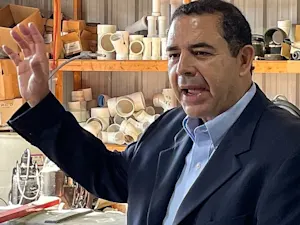
Trump Defies Court as Cities Brace for Federal Troops
Los Angeles riots, June, 2025. Photo courtesy of the U.S. Northern Command. Public domain.
President Donald Trump's bold move to deploy National Guard and Marines to Los Angeles has hit a major legal roadblock, as a federal judge reportedly ruled the operation a violation of the Posse Comitatus Act. This ruling comes amid Trump's public declarations that he plans to send federal law enforcement to other major cities like Chicago and Baltimore, despite fierce opposition from local officials. The unfolding drama pits constitutional limits against executive ambition, setting the stage for a high-stakes showdown over the balance of power in America's cities.
A Legal Blow in California
In a detailed 52-page ruling, US District Judge Charles Breyer, a Clinton appointee, declared that the deployment of military troops to Los Angeles violated a law dating back to 1878 designed to keep the military out of domestic law enforcement, as reported by POLITICO. The Posse Comitatus Act prohibits the military from performing police functions such as arrests, crowd control, and searches without explicit congressional approval. Breyer's decision specifically barred the Pentagon from using National Guard members and Marines in California to carry out these activities, calling the deployment a "systematic and willful" violation of the law.
The judge warned that the Trump administration's operation, overseen by Defense Secretary Pete Hegseth, appeared to be an attempt to create a "national police force with the President as its chief," as reported by POLITCO. The ruling came after a trial that reportedly included testimony from Pentagon officials who managed the troop deployment. Breyer noted that the troops, known as Task Force 51, were expressly instructed to engage in law enforcement activities such as setting up protective perimeters, traffic blockades, and crowd control actions that the judge said have no exception under the Posse Comitatus Act.
While the judge did not order the immediate withdrawal of the remaining 300 troops in Los Angeles, he reportedly restricted their role to protecting federal property and prohibited them from engaging in any law enforcement functions without congressional authorization. The ruling was put on hold temporarily to allow the Trump administration to appeal, but it marks a significant legal rebuke to the president's approach.
Trump's Defiant Plans for Chicago and Baltimore
Despite the setback in California, President Trump has doubled down on his plans to send federal law enforcement to other cities, specifically Chicago and Baltimore. Speaking from the Oval Office, Trump insisted that federal intervention is necessary to combat crime in these cities, framing it as a duty rather than a political move. He declared, "We're going in," when asked about deploying National Guard troops to Chicago, though he did not specify a timeline, as reported by the Associated Press.
Trump expressed frustration with local leaders who oppose federal involvement. Illinois Governor JB Pritzker, for example, has repeatedly said he will not request federal troops, calling Trump's comments "unhinged," according to the Associated Press. Yet Trump asserted that he has the authority to act regardless of state consent, signaling a willingness to bypass local resistance. Chicago's mayor and state attorney general have also criticized the move, with the mayor blaming gun trafficking from neighboring states and the attorney general calling the federal plan "disingenuous and performative," according to the Chicago Sun Times.
In Baltimore, similar opposition has emerged from local officials and Maryland's governor, Wes Moore. Trump, however, remains steadfast, citing the success of federal efforts in Washington, D.C., where he claims crime has been significantly reduced since federal forces were deployed. The White House announced that more than 1,650 arrests have been made since federal officials began operations in the capital, as reported by the Associated Press.
The Constitutional Clash
At the heart of this conflict lies a fundamental question about the limits of presidential power and the role of the military in domestic affairs. The Posse Comitatus Act was enacted to prevent the military from becoming a tool of domestic law enforcement, preserving a clear boundary between civilian policing and military authority. Judge Breyer's ruling reaffirms this boundary, emphasizing that any deviation requires explicit congressional approval or invocation of exceptions like the Insurrection Act, which Trump has not used in these cases, as reported by The Daily Beast.
The Trump administration's legal team faces an uphill battle in appealing the ruling, as the court found that the deployment was not a one-off mistake but rather the "function of systematic and willful orders to troops to execute domestic law," as reported by POLITICO. The judge also questioned the administration's justification for the deployment, noting there was no rebellion or inability of civilian law enforcement to handle protests and crime in Los Angeles.
Political and Public Reactions
California Governor Gavin Newsom hailed the ruling as a victory against what he called the militarization of the streets. He reportedly took to social media to declare that the courts agreed with his position that the use of military forces against US citizens in this manner is illegal. On the other hand, the White House criticized the decision, accusing the judge of overstepping and undermining the president's authority as commander in chief. A spokesperson vowed that the administration would continue to fight for its mandate to "Make America Safe Again," as reported by The Daily Beast.
Meanwhile, local leaders in Chicago and Baltimore are preparing for a legal and political battle against federal intervention. Illinois officials have reportedly indicated plans to sue once federal forces arrive, framing the move as an overreach that undermines local governance and community trust.
What This Means for America's Cities
This unfolding confrontation highlights the tension between federal authority and local control, a debate that has intensified in recent years amid rising crime rates and political polarization. For residents of cities like Los Angeles, Chicago, and Baltimore, the presence of federal troops and law enforcement can be both a reassurance and a source of anxiety, depending on one's perspective.
The coming months will be critical in determining whether the federal government can expand its footprint in local law enforcement or whether the judiciary and state leaders will successfully check what some see as executive overreach. Either way, the battle over troops in America's cities is far from over.
References: Judge rules Trump can't act as national police chief | Trump says he will order federal intervention in Chicago and Baltimore | Major Blow to Trump as Judge Rules Troop Deployment Unlawful | Pentagon has been planning military deployment to Chicago for weeks, report says






















